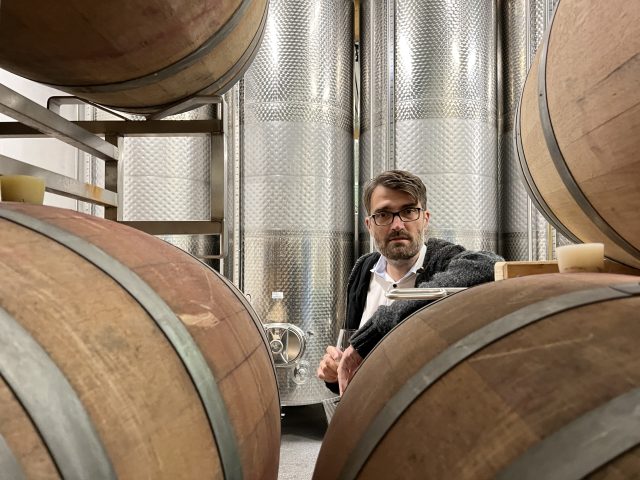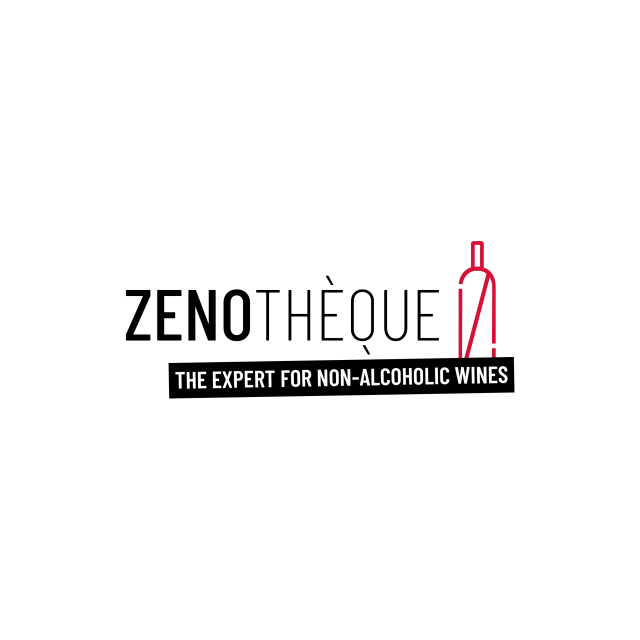This website uses cookies so that we can provide you with the best user experience possible. Cookie information is stored in your browser and performs functions such as recognising you when you return to our website and helping our team to understand which sections of the website you find most interesting and useful.
Zenotheque leads the way in low-alcohol wines
There was a time when low- and no-alcohol wines were vetoed for their lacklustre quality. Today, however, there is a movement towards finessed, low-ABV wines and Zenotheque is leading the charge.

In recent years, the low- and no-alcohol category has gained sizeable ground. While beer and spirits have flourished, giving us imaginative, truly delicious takes, wine has fallen behind.
Here to change our opinion is Zenotheque, a company specialising in the production and sales (B2B and B2C throughout Europe) of low- and no-alcohol wines. It partners with top winemakers and cooperatives in Germany and France, offering solutions throughout the entire value chain, from winegrowers, retailers and importers.
Founded by Frédéric Chouquet-Stringer, Zenotheque launched in November 2021 with the aim of “creating and marketing the best alcohol-free wines”, says Chouquet-Stringer.
As a young company it has already racked up a lot of recognition, with its dealcoholised wines appearing at Wine Paris, Berlin Fashion Week, on the menu of double Michelin star restaurants and ProWein. “Our key target is not only to support wineries to make top wines, we also want to make those wines available for distributors and end-consumers.”
Zenotheque also received 16 medals in the drinks business‘ Low and No Masters competition – nine bronze, six silver and one gold – proving that it has real clout when it comes to creating high-quality, low-alcohol wines.
Often misunderstood and overlooked as a category, Zenotheque decided to break into the no- and low-alcohol universe to put its mark of quality on the industry. “We work with winemakers who put their name on the label and are proud of what goes into every bottle”.
Moreover, if you look at the recent statistics there is clearly a thirst for alcohol-free drinks –according to research by DrinkAware, a fifth of UK adults use alcohol-free drinks as a way of moderating their alcohol consumption. In this context Zenotheque is in a prime position to help winemakers expand their product ranges, generate more sales and attract new and target customers.
As it stands, Zenotheque dealcoholises 21 wines. It does this by working closely with providers of the specific technology required to lower the alcohol volume from the wine. “You need to really understand the technology in order to understand which wines have which treatment,” explains Chouquet-Stringer.
Initially, when Zenotheque first launched, Chouquet-Stringer and the team would cold call winemakers encouraging them to try out its service. “We wanted to make sure our offering was really attractive. That’s why we use 10 litres of wine as a sample to see what happens and developed small volumes offer .” In this respect, there’s zero risk involved for the winemaker.
When it comes to what type of wines are best to dealcoholize, there are several questions to consider. “What is the target of the winemaker? Who is going to be drinking the wine? With what pricing and quality expectation? What is the best equipment to match these needs? ” asks Chouquet-Stringer.
“You can dealcoholize almost every type of wine; we’ve worked with older wines as well as younger wines. When the wine is more mature, the result is more complex and maybe more suitable for wine lovers.” Ultimately, “the quality of the base wine is the be-all and end-all.”
So what’s ahead for Zenotheque in the new year? “We’ll be appearing at Wine Paris in February and at ProWein in March. We’ve also just joined with La WineTech“, which gives leverage to startups and innovative players in the wine industry as a way to build the future of the sector. The first quarter will be strong because many of our customers have already pitched to us for wine fairs coming up in January. We are also very happy to continue to develop online offering in Germany (www.alkoholfrei-vom-winzer.de) and to officially launch our French web shop too (www.sans-alcool-du-vigneron.fr). We will also strengthen our cooperation with distributors, to whom we can provide a wide range of top quality products.”
Below, Patrick Schmitt MW provides his tasting notes for the 16 wines that received medals at our Low and No Masters competition.
Reverse Weissburgunder, Bergdolt-Reif & Nett, Palatine (silver)
“This no-alcohol Pinot Blanc is subtly sweet with 5.8g/l of residual sugar. It has notes of honey and ripe orange, with a hint of tea leaf and raisin and then a fresh finish. A light and crisp white wine, it presents itself as light-footed yet complex on the palate.”
Null Alkohol Rot, Weingut Löffler, Baden (bronze)
“Located directly on the Baden wine route, between the popular small town of Staufen and the tranquil wine-growing town of Ballrechten-Dottingen, Weingut Loffler occupies 22 hectares of vines. Their light no-alcohol Pinot-based red has notes of cherry tomato and dried herbs, complemented by a firm, dry tannic finish.”
Rose free, Weingut Anton, Palatine (bronze)
“This light, no-alcohol red packs flavours of dark cherry and black berries along with a touch jammy strawberry fruit mix. It has notes of dried herbs and fresh redcurrants.”
Rose Sparkling free, Weingut Anton, Palatine (silver)
“The highly-aromatic nature of the Saint Laurent grape variety gives this alcohol-free pink sparkling a subtle sweetness with notes of strawberry bubblegum and lemon sherbet. It has a delicate fizz and a fresh, dry, chalky finish.”
Cuvee Zero, Schloss Neuweier, Baden (silver)
“The high-altitude vineyards around Baden give this alcohol-free sparkling wine a distinct minerality. That combined with the sweet notes of gooseberry, fresh apple, raisin, petrol and citrus, make it both fresh and fruity.
Cuvee Sans alcool, Schloss Neuweier, Baden (bronze)
“After a gentle dealcoholization, this zero-alcohol sparkling white still has an abundance of character and elegance. There are notes of elastic band and green apple, along with characters of fresh grape juice, raisins and lime cordial, with 4.5g/l of residual sugar to give it a delicate sweetness. The fine stream of bubbles add a refreshing finish.”
Blanc Pur, Sektmanufaktur Strauch, Rheinhessen (gold)
“An appealing alcohol-free sparkling Riesling with flavours of ripe apple and fresh grapes, a hint of petrol, and a delicate sweetness, followed by a fresh, clean finish, with a note of bitter lemon.”
no limit Riesling, Weingut Daniel Mattern, Riesling (bronze)
“This no-alcohol white wine has all the characteristics of a classic Riesling, with notes of ripe peaches, apricots and quince. Overall it has a slight sweetness with racy acidity. Flavours of lime, apple and tea leaves give it a fresh and lively finish.”
Rib0, Cave de Ribeauville, Alsace (silver)
“The grapes used to make this no-alcohol white wine grow on steep sloped vineyards, before being gently compressed. Once the juices have been extracted and left to ferment for three to six months, the wine is dealcoholised using no chemical intervention. The resulting wine has a light body, gentle sweetness, but dry zesty finish. It’s brimming with flavours from flowers, fresh grapes, along with hints of petrol and lime cordial too.”
Reserve Riesling, Bergdolt-Reif & Nett, Pflaz (silver)
“Located just outside Pflaz, the vines that grow the grapes used in this no-alcohol Riesling, have an almost Mediterranean climate. It’s a little reserved on the nose, but bursting with fresh acidity and classic Riesling notes of citrus fruit, apple and a hint of peach on the palate.”
Breakaway Pinot Blanc, Bergdolt-Reif & Nett, Pflaz (silver)
“This alcohol-free Pinot Blanc is aged in 500l wooden barrels that give it a brilliant, light-yellow colour with aromas of lemon and green apples. Crisp and light with a bright acidity, the wine has a sweet, fruit-forward flavour profile with notes of green apple and hints of white flower blossom.”
Rouge Pur, Sektmanufaktur Strauch, Rheinhessen (silver)
“This no-alcohol sparkling wine is created from a blend of hand-picked grapes from vineyards around Osthofen in Rheinhessen. After a long maceration the wine is aged in wooden barrels and then dealcoholised via reverse osmosis with no chemical intervention. In the glass, the Rouge Pur is full bodied with red fruit and a touch of spice on the nose and palate.”
Riesling free, Weingut Anton, Nahe (bronze)
“In 1925 the winery of Anton and Carl Finkenauer was split as the two brothers decided to go their own ways. Since then, the Anton family has continued making wine in the heart of the Southern Palatinate, which boasts some of the warmest climates in Germany. This alcohol-free, Riesling free is distinctively dry with subtle acidity and textbook Riesling characteristics, including fresh citrus and tropical fruits.”
Blanc de Blanc free, Weingut Anton, Nahe (bronze)
“An alcohol-free sparkling wine from Weingut Anton, made using cream-of-the-crop Riesling grapes that grow in loess soils in southern Palatinate. As soon as the bottle is opened, it delivers ripe notes of lime and citrus zest. It’s also beautifully dry with a fresh acidity and subtle minerality.”
Rib0 Sparkling, Cave de Ribeauvillé, Alsace (bronze)
“Created out of a desire to be the “pioneer of something special”, Cave de Ribeauvillé’s no-alcohol sparkling wine has inviting aromas of nectarine and biscuit leading to a sophisticated, delicate palate. It’s balanced with flavours of stone fruit skins and lemon, with balanced acidity and a fresh finish.”
Rosé Pur, Sektmanufaktur Strauch, Rheinhessen (silver)
“The base wine that makes this alcohol-free sparkling rosé is initially aged in stainless steel tanks and then left on the lees in wooden barrels for at least 15 months. Once dealcoholised the result is a wine that has layered, fruity aromas and a full-bodied appearance. The stream of fine bubbles gives it refreshing acidity.”


